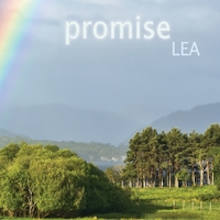The Graham Album Review #2016

Click on CD Cover for Audio Review in streaming mp3 format | |
Lea: Promise
by George Graham
(Independent release as broadcast on WVIA-FM 2/26/2020)

Click on CD Cover for Audio Review in streaming mp3 format | |
Lea: Promise
by George Graham
(Independent release as broadcast on WVIA-FM 2/26/2020)
To stand out in the crowded field of singer-songwriters, one needs to bring something distinctive to the equation, whether it’s songwriting style, originality in lyrics, a one-of-a-kind vocal approach, or sense of eclecticism that brings together stylistic ingredients in interesting ways.
This week we have one of the latter, a singer-songwriter whose styles on her new release run from jazzy to some bluegrass, with a lyrical approach that seems inspired by spirituals. She goes by the single name Lea, and her new release is called Promise.
Lea was born into a musical family in Baltimore. Her father played trumpet in the soul band Black Heat, a group which was founded my her mother’s brother Chip Jones. She writes in her web autobiography that while in school, she was wanted to be a veterinarian, but at age 13, discovered the acoustic guitar, and said she taught herself how to play it by writing songs. Her path toward music was set, including spending her senior year of high school at a classical conservatory in Germany.
She has been performing and recording ever since, appearing with much luminaries as Odetta and Mavis Staples. She released her debut recording in 2000, and now she is out with her eleventh release, Promise. She has spent most of her time in the Washington, DC, area, where she has won various award from the Washington Area Music Association.
Lea herself calls her music “SoulFolk” and it brings together elements of both, but she casts a rather wide stylistic net on the new album. There are some jazz-influenced arrangements, an a cappella piece, one with a church-style reed organ, a little bluegrass-style banjo and a fair amount of lyrical influence from spirituals. She is joined by variable cast of supporting musicians, including Mark Sylvester and Sol Roots on additional guitars, Marcus Horndt and Brian Simms on keyboards, Will Henderson on bass, and Sven von Samson on percussion, rather than a full drumset. Also adding a distinctive touch is Seth Kibel, who plays flute prominently on a couple of tracks.
While the lyrics on Promise are not straight-out religious, many of the songs take rather a philosophical viewpoint and several offer the kind of uplifting message that a Gospel song would provide.
Opening is a piece called Morningbird with Kibel’s flute providing the musical impression of the birdsong, in this jazzy tune with some Latin influence. <<>>
More upbeat is Every Day which combines a kind of spiritual message in a bluesy-jazz setting, reminiscent in a way of the music of Nina Simone. <<>>
The title song Promise is a more contemplative piece whose lyrics again try to exhort optimism in the face of some kind of difficult situation. <<>>
The Gospel influence comes to the fore on a short a cappella song called A Dedication. Lea sings the parts by means of overdubbing, and it’s very well done. <<>>
Another short piece on this 14-track album is I Can’t Touch the Butterfly a jazzy acoustic guitar solo by Lea. <<>>
The sound turns to bluegrass on the song called Bread Alone which expounds on a biblical phrase. <<>>
Another song of optimism is called Two which is basically a pep talk for someone who might be down in spirits. <<>>
The Gospel influence takes the form of an arrangement built around a reed organ on the song Wherever You Are. Again, the message is meant to be uplifting. <<>>
Promise, the new album by Washington, DC area self-described “SoulFolk” artist Lea is a worthwhile and enjoyable recording by a performer whose eclecticism is rather wide-ranging. She brings together jazz, folk, Gospel and bluegrass in an album whose lyrics are consistently uplifting. Lea often performs for church groups and in schools, and has had residencies in academic situations, so the songs would fit those settings well.
Our grade for sound quality is close to an “A” with good clarity, a pleasing lack of dumb studio tricks, and a generally warm sound. As usual, we’ll deduct some points for volume compression that undermines the dynamics of the recording.
There are not a lot of African-American women folkies on the scene – Tracy Chapman and the late Odetta come to mind as prominent examples, along with Rhiannon Giddens on the more contemporary scene. Lea has been recording and performing for some 20 years in the Washington. DC, area. With her new album getting some national promotion, hopefully she will receive the wider recognition she deserves.
(c) Copyright 2020 George D. Graham. All rights reserved.
This review may not be copied to another Web site without written permission.
 To Index of Album Reviews | To George Graham's Home Page. | What's New on This Site.
To Index of Album Reviews | To George Graham's Home Page. | What's New on This Site.